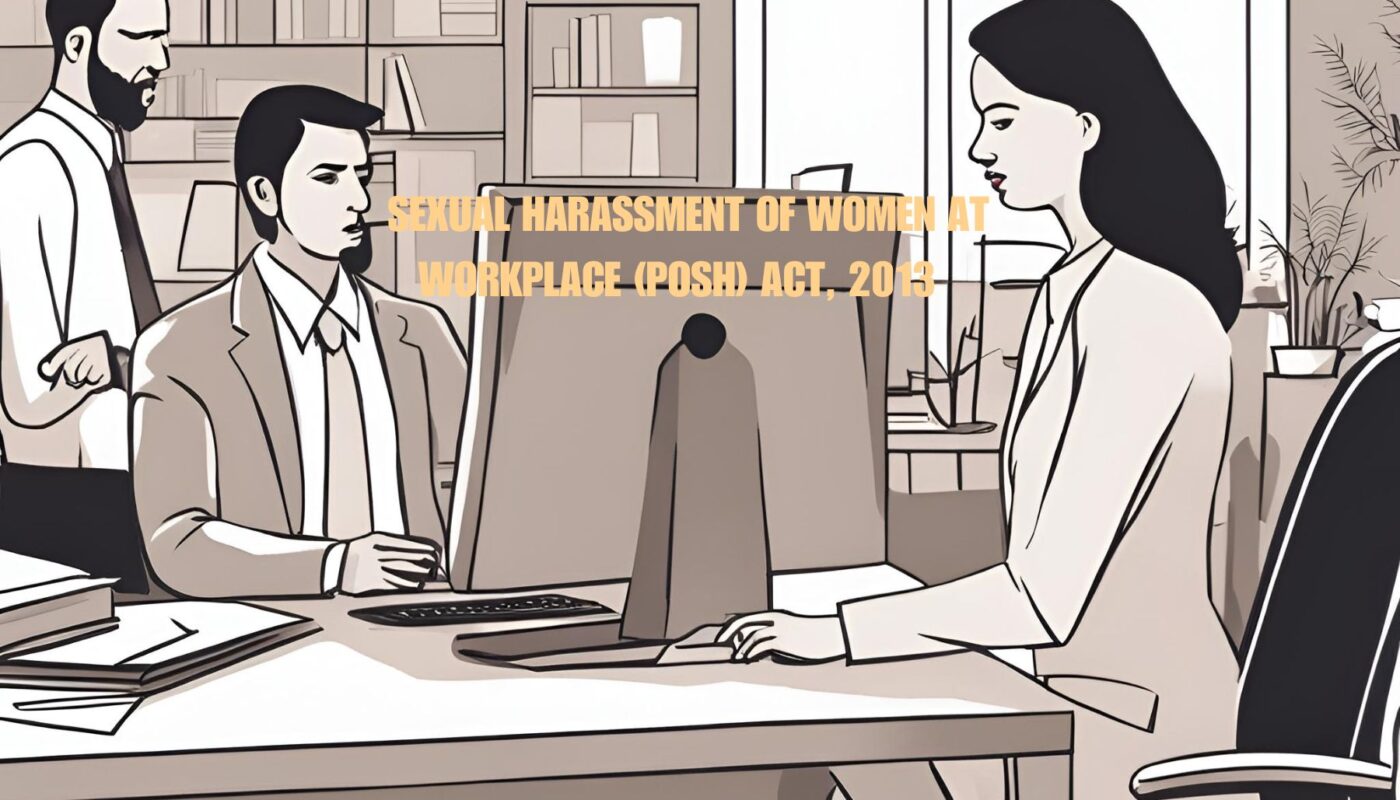Definition of Sexual Harassment: “Sexual harassment” encompasses any one or a combination of the following unwelcome acts or behaviors, whether directly or indirectly implied:
Physical Contact and Advances: Involves unwarranted physical touch or advances towards an individual.
Demand or Request for Sexual Favors: Implies asking or pressuring someone for sexual acts in exchange for benefits.
Making Sexually Colored Remarks: Includes remarks or comments of a sexual nature that are inappropriate or offensive.
Showing Pornography: Involves displaying or sharing explicit sexual material without consent.
Any Other Unwelcome Conduct of Sexual Nature: Encompasses any form of unwelcome physical, verbal, or non-verbal behavior that has a sexual undertone.
Definition of Workplace: “Workplace” is defined broadly to include various settings:
Departments, organizations, establishments, or units financed by the government, local authorities, government companies, corporations, or cooperative societies.
Private sector entities engaged in commercial, professional, vocational, educational, entertainment, industrial, health services, or financial activities.
Hospitals, nursing homes, sports institutes, stadiums, or sports venues used for training or sports activities.
Locations visited by employees during employment-related activities, including transportation provided by the employer.
Dwellings or houses where work-related activities occur.
Definition of Unorganized Sector in a Workplace: In the context of a workplace, the “unorganized sector” refers to enterprises owned by individuals or self-employed workers engaged in goods production, sales, or service provision. These enterprises, if employing workers, have fewer than ten employees.
Section 3 Prevention of Sexual Harassment
Basic Principle: The fundamental principle is that no woman should be subjected to sexual harassment in any workplace. This sets the foundational expectation that all workplaces should be free from any form of sexual harassment.
Defining Sexual Harassment: The circumstances that can amount to sexual harassment are not limited to explicit actions but can also include implicit behaviors. Some of these circumstances include:
Promise of Preferential Treatment: Offering preferential treatment in employment in exchange for inappropriate behavior.
Threat of Detrimental Treatment: Threatening a woman with negative consequences in her employment if she does not comply with inappropriate demands.
Threats about Employment Status: Threatening a woman’s current or future employment status as a form of coercion.
Creating Hostile Work Environment: Interfering with a woman’s work or creating an environment that is intimidating, offensive, or hostile.
Humiliating Treatment: Subjecting a woman to treatment that is humiliating and likely to impact her health or safety.
Section 4: Constitution of Internal Complaints Committee
Mandatory Formation of Internal Complaints Committee: Every employer is mandated to establish an Internal Complaints Committee by issuing a written order. This committee is responsible for addressing complaints related to sexual harassment within the workplace.
Composition of the Internal Complaints Committee: The committee should include the following members nominated by the employer:
Presiding Officer: A senior-level woman employee from within the organization shall be the presiding officer. If a suitable woman employee is not available, the officer can be nominated from other offices or administrative units within the same organization or even from another workplace under the same employer.
Members: At least two employees, preferably those supporting women’s causes, having social work experience, or legal knowledge. Additionally, one member from a non-governmental organization or association dedicated to women’s causes or someone knowledgeable about sexual harassment issues. It is required that at least half of the total members nominated should be women.
Tenure of the Committee Members: The Presiding Officer and other members of the committee will hold office for a specified period, not exceeding three years from the date of their nomination.
Compensation for NGO or Association Member: The member selected from non-governmental organizations or associations will be compensated with fees or allowances for their participation in the committee proceedings as prescribed.
Conditions for Removal of Committee Members: The text outlines conditions under which a Presiding Officer or Member of the Committee may be removed, such as contravention of specified provisions, conviction for an offense, pending inquiry or disciplinary action, or actions prejudicial to public interest. In such cases, the concerned member shall be removed and replaced in accordance with the nomination procedures.
Section 7: Local committee
Constitution and Jurisdiction of Local Committee: The District Officer is responsible for establishing a committee, known as the “Local Committee,” in the district to receive complaints of sexual harassment from establishments where an Internal Committee couldn’t be formed due to having fewer than ten workers or if the complaint is against the employer directly.
A nodal officer is designated in every block, taluka, tehsil, ward, or municipality to receive complaints and forward them to the respective Local Committee within seven days.
The jurisdiction of the Local Committee extends to the areas of the district where it is established
Section 9: Complaint of Sexual Harassment
Filing a Complaint: Any aggrieved woman can file a written complaint of sexual harassment at the workplace within three months from the date of the incident or the last incident if it occurred multiple times. If the woman cannot file a written complaint, the committee members should assist her in doing so. The Internal Committee or the Local Committee can extend the time limit up to three months if valid reasons exist for the delay.
Complaint on Behalf of an Incapacitated Woman: If the aggrieved woman is unable to file a complaint due to incapacity or death, her legal heir or another prescribed person can file the complaint.
Section 10: Conciliation
Settlement: The committees can attempt conciliation at the request of the aggrieved woman before initiating an inquiry. Monetary settlements are not permitted. If a settlement is reached, it must be recorded and forwarded for appropriate action.
After Settlement: Copies of the settlement must be provided to the aggrieved woman and the respondent. If a settlement is reached, no further inquiry is conducted.
Section 11: Inquiry into Complaint
Initiating Inquiry: The Internal Committee or the Local Committee will proceed with an inquiry in accordance with service rules or prescribed manner.
In the case of a domestic worker, if a prima facie case exists, the complaint is forwarded to the police for necessary action.
If terms of a settlement are not met, the inquiry will proceed or the complaint will be forwarded to the police.
Opportunity for Hearing: Both parties are given a chance to be heard during the inquiry, and findings are shared with them for representation.
Powers of the Committee: The committee has powers like summoning individuals, taking oaths, requesting documents, and others as prescribed.
The inquiry needs to be completed within 90 days
Inquiry into Complaint under Chapter V of POSH Act 2013
Section 12: Action during pendency of inquiry
During an inquiry, the committee may recommend
Transfer of the aggrieved woman or the respondent to another workplace.
Granting leave to the aggrieved woman for up to three months.
Providing any other prescribed relief.
Leave granted to the aggrieved woman is in addition to regular leave entitlement.
The employer must implement the recommendations and report back to the committee.
Section 13: Inquiry report
After completing the inquiry, the committee provides a report to the employer or District Officer within ten days.
If the allegation is not proven, the committee recommends no action.
If the allegation is proven, recommendations include taking action for sexual harassment as misconduct and determining compensation.
Section 14: Punishment for false complaints and evidence
Recommends action against those making false or malicious complaints or producing false evidence.
Intent must be proven after an inquiry before any action.
Section 15: Determination of compensation
Factors considered for determining compensation include mental trauma, career loss, medical expenses, respondent’s financial status, and payment feasibility.
Section 16: Prohibition of publication
Contents of complaints, identities of involved parties, inquiry details, and actions taken should not be made public.
Information about justice secured may be shared without revealing identities.
Section 17: Penalty for publication
Penalties for contravening publication restrictions according to service rules or prescribed manner.
Section 18: Appeal
Allows appeals against recommendations, non-implementation, or specific sections within 90 days.
Appeal process is in accordance with service rules or as prescribed.
Duties of Employer under Section 19 of the POSH Act 2013
Provide a Safe Working Environment (Section 19(a)): Employers are required to ensure a safe working environment at the workplace. This includes safety from persons coming into contact at the workplace who may engage in sexual harassment.
Displaying Information (Section 19(b)): Employers must display at a conspicuous place in the workplace Information about the penal consequences of sexual harassment. Details of the Internal Committee as constituted under Section 4(1) of the Act.
Organize Workshops and Awareness Programs (Section 19(c)): Employers must conduct workshops and awareness programs at regular intervals to sensitize employees about the provisions of the Act. They should also conduct orientation programs for the members of the Internal Committee as prescribed.
Provide Necessary Facilities (Section 19(d)): Employers are required to provide the necessary facilities to the Internal Committee or the Local Committee for dealing with complaints and conducting inquiries related to sexual harassment.
Assist in Securing Attendance (Section 19(e)): Employers should assist in securing the attendance of the respondent and witnesses before the Internal Committee or the Local Committee as required.
Provide Information (Section 19(f)): Employers must make available any information requested by the Internal Committee or the Local Committee concerning a complaint under Section 9(1) of the Act.
Assistance in Filing Complaints (Section 19(g)): Employers must assist women if they choose to file a complaint related to sexual harassment under the Indian Penal Code or any other applicable law.
Initiate Legal Action (Section 19(h)): Employers are required to initiate legal action under the Indian Penal Code or any other relevant law against the perpetrator of sexual harassment. This includes taking action against non-employees if the incident occurred in the workplace.
Treat Sexual Harassment as Misconduct (Section 19(i)): Employers must treat sexual harassment as misconduct under their service rules and take appropriate disciplinary action for such misconduct.
Monitor Committee Reports (Section 19(j)): Employers should monitor and ensure the timely submission of reports by the Internal Committee.




Thank you, I’ve recently been looking for info approximately this subject for ages and yours is the greatest I’ve discovered so far. But, what in regards to the bottom line? Are you certain in regards to the supply?
I loved as much as you’ll receive carried out right here. The sketch is attractive, your authored subject matter stylish. nonetheless, you command get got an impatience over that you wish be delivering the following. unwell unquestionably come further formerly again as exactly the same nearly very often inside case you shield this increase.
I don抰 even know how I ended up here, but I thought this post was great. I don’t know who you are but definitely you’re going to a famous blogger if you are not already 😉 Cheers!
Terrific post however I was wanting to know if you could write a litte more on this subject? I’d be very thankful if you could elaborate a little bit further. Thank you!
It’s a pity you don’t have a donate button! I’d certainly donate to this outstanding blog! I guess for now i’ll settle for book-marking and adding your RSS feed to my Google account. I look forward to brand new updates and will talk about this blog with my Facebook group. Chat soon!
Today, I went to the beachfront with my kids. I found a sea shell and gave it to my 4 year old daughter and said “You can hear the ocean if you put this to your ear.” She put the shell to her ear and screamed. There was a hermit crab inside and it pinched her ear. She never wants to go back! LoL I know this is entirely off topic but I had to tell someone!